Clarity Law

Jack Marshall
Jack is a former soldier and now a criminal defence lawyer with Clarity Law. He helps clients navigate the court process and get the best results.
What is the Criminal Burden of Proof in Queensland?

If you have ever seen a police procedural show or film about a criminal law trial, you undoubtedly have heard the phrase Beyond a Reasonable Doubt.
Beyond a Reasonable Doubt is the standard by a Judge, Magistrate or Jury must be satisfied that is person guilty, for them to convict a defendant for a crime. It is the burden which the prosecution must meet to secure a conviction for an offence.
What exactly does Beyond a Reasonable Doubt actually mean?
The High Court of Australia has wrestled with this problem in 2017, where they have said it is generally unwise for a trial judge to try to analyse and define what reasonable doubt is, but ultimately determined that it can assist a jury by explaining and contrasting the standard to that of the civil standard, being on the Balance of Probabilities.
What is the Balance of Probabilities?
The civil standard of Balance of Probabilities is simple. Is it 51% or more likely that the facts presented are probably correct and occurred as stated.
This is a stark contrast to Beyond a Reasonable Doubt. In the civil arena, a decision make must simply be more sure than not that the facts are correct, however by the criminal standard, a decision maker must have no reasonable doubt that a defendant is guilty of each and every element of the offence.
It is said that if there is any reasonable doubt or any element of the offence, it is the duty of that Judge, Magistrate or Jury to find the defendant not guilty.
Guilt beyond a reasonable doubt is the highest standard of proof in the Queensland and wider Australian legal system.
Conclusion
This article is a simple and concise outline of a deeply complex and in some ways undefinable principle. Reasonable Doubt will turn on the individual facts of each case and bears significant consideration.
If you have been charged with a Criminal or Traffic Offence, seek legal advice of your rights and options with respect of the charges which have been laid.
What happens if you breach a probation or community service order?
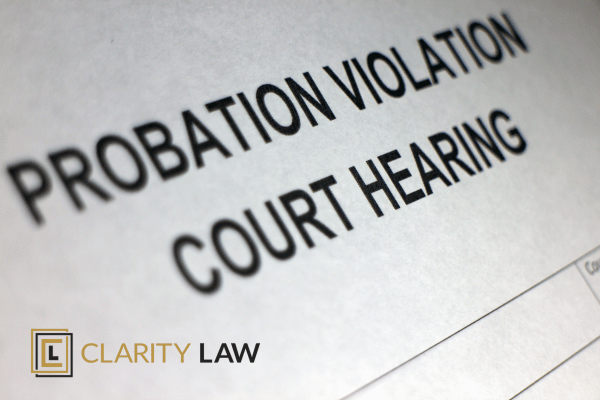
What happens if I breach my probation or community service order?
If you have been sentenced in Court to a period of Probation or a Community Service Order, you are required to comply with the requirements of that order, with the big-ticket items being to not commit further offences whilst on an order, to report when require and/or complete any community service hours as ordered.
If you fall afoul of these and other requirements, you have committed an offence of breaching a probation order / Community Service Order. The offence of breaching these orders is considered a serious offence, not because of the maximum penalty specific to the offence under s123 of the Penalties and Sentences Act, however because of the power the court has if a breach is brought to the court.
What does the law say?
- An offender who contravenes, without reasonable excuse, a requirement of a community based order commits an offence.
Penalty— Maximum penalty—10 penalty units.
- Subsection (1) applies—
(a) whether or not the contravention is an offence against another Act or law; and
(b) whether the contravention happens in or out of Queensland.
What does the prosecution need to prove?
Unlike most criminal or traffic offences, the Queensland Police Service do not prosecute the breach probation order offences, that is done by a legal officer from Queensland Corrective Services.
Queensland Corrective Services must prove that an offender, was:
- subject to a community based order; and
- the offender, without a reasonable excuse has contravened a requirement of the community based order.
The elements of the offences are simple and usually fairly easily made out.
Are there any defences?
The primary defence to breaching a Community Based Order is effectively, whether you had a reasonable excuse not to comply with a requirement. This could look like an illness or injury which prevented you from attending – although in these circumstances you have obligations to advise that you cannot attend.
What are the usual penalties for this offence?
The offence of contravene requirement of a community based order itself is quite minor, being a maximum fine of 10 penalty units.
It is the power that is enlivened when a breach is proven which becomes the significant issue for offenders.
The court has the power to increase the number of community service hours an offender has to complete (is applicable), extend the period of probation by 12 months or at the more serious end may do two things:
-
If the order was originally made by a Magistrates Court, they may resentence the offender for the offences they originally received the community based order for; or
-
If the order was made by a superior court, such as Supreme or District Court, the court may:
-
Commit the offender to custody; or
-
Grant the offender bail on the condition they appear before the superior sentencing court – where they will be resentenced.
-
What does this offending look like?
This offence can arise in a number of situations, ranging from failing to update the Community Corrections Officer of a change of address within 2 business days to much more serious breaches of committing further offences.
Example 1. Bill was sentenced in Brisbane to a period of probation for 12 months. During the period of probation, Bill wasn’t particularly receptive to supervision and failed to report to Community Corrections when required. Bill failed to attend 3 times and his probation officer commenced breach proceedings against him. Community Corrections issued a summons and Bill had to attend court to on a Breach of Probation in the Cleveland MagistrtesC Ourt. The court determined that it was a minor breach and made the decision to fine Bill for the breach and extend his probation by 6 months.
Example 2. Regina was sentenced by the Supreme Court to a period of Probation for 2 years. During this time, Regina is brought before the court for a series of drug possession offences which caused her to contravene the conditions of her probation order. The Court deals with the matters in the Magistrates Court jurisdiction of Southport and Community Corrections takes a breach action against her. As a result of the Breach action, the Magistrates Court commits the matter to the Supreme Court, and gives her bail on the undertaking that she appears to be sentenced in the Supreme Court.
These are just two examples of how this offending can occur, it encompasses a wide range of circumstances which can arise when community based orders aren’t followed. It is important to take these orders seriously and get legal advice if Community Corrections decide to pursue you for a breach offence.
What court will hear my matter?
The matter will always start in the Magistrates Court. The Contravention offence will be dealt with by the Magistrate’s Court, however, resentences will occur in a higher court if that is where the order was originally made.
Why should I get legal advice if I am going to be resentenced?
The short answer to this question, is to put your best legal foot forward and identify if it is necessary for the court to resentence for the breach. If the court determines that resentencing is necessary, taking advice of experienced practitioners puts you in the best possible position.
Conclusion
This article by no means covers the entire suite of situations and outcomes that arise out of a contravention of a community based order offence. This article is designed to assist those who are facing this offence to get a better understanding of the offence, their options and critically empower them to ask the right questions of their legal representatives.
Engaging Clarity Law to act for you
Engaging us gives you the best chance at trying to avoid serving time in prison. We are one of the leading criminal law firms in South East Queensland. Just some of the benefits of us acting for you include:
-
we know the judges and what they want to hear to give you the best outcome
-
we have good relationships with the prosecutors meaning we can often have them not seek an actual prison sentence
-
we are there to help you through the process and make everything as stress free as possible
-
engaging us shows the court you are taking your charges seriously
-
you will be fully informed of what is to happen in court and what this means for you after court
-
unlike the police or the Judge, we are there to look after you, your privacy and your interests
How do I get more information or engage you to act for me?
If you want to engage us or just need further free information or advice then you can either;
-
Use our contact form and we will contact you by email or phone at a time that suits you
-
Call us on 1300 952 255 seven days a week, 7am to 7pm
-
Click hereto select a time for us to have a free 15 minute telephone conference with you
-
Email the firms founder on This email address is being protected from spambots. You need JavaScript enabled to view it.
-
Send us a message on Facebook Messenger
-
Click the help button at the bottom right and leave us a message
We are a no pressure law firm, we are happy to provide free initial information to assist you. If you want to engage us then great, we will give you a fixed price for our services so you will know with certainty what we will cost. All the money goes into a trust account monitored by the Queensland Law Society and cannot be taken out without your permission or until we are legally allowed to.
Urinating in a public place
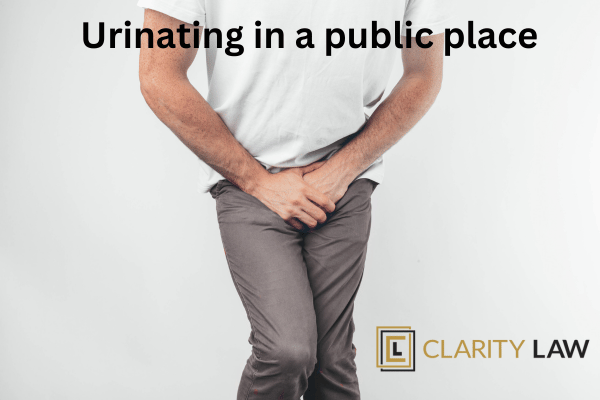
It is unsurprisingly that it is an offence in Queensland to urinate in a public place, it is an offence that is broadly considered that interferes with the publics peaceful and lawful use of a public place. It is gnerally considered to be a type of public nuisance offence.
The police can issue an infringent notice for this offence or summon a person to court to face a public urination charge.
There is considerable debate whether the charge of public urination should be removed.
What exactly does the law say about this offence?
Urinating in a public place is an offence under against section 7 of the Summary Offences Act 2005 under Queensland criminal law.
The law states that A person must not urinate in a public place.
Maximum penalty—
- if the person urinates within licensed premises, or in the vicinity of licensed premises—4 penalty units; or
- otherwise—2 penalty units.
- In a proceeding for an offence against subsection (1), evidence that liquid was seen to be discharged from the vicinity of a person’s pelvic area is enough evidence that the person was urinating.
- In this section— public place does not include a facility in a public place that is designed for use as a toilet.
What do the Prosecution have to prove?
This is an offence which is extremely clear, and has quite basic fault elements.
The Police have to prove:
-
The defendant;
-
Urinated (or at least, liquid was observed to be seen being discharged from a person pelvic area); and
-
That they did so in a public place, noting that this includes a place which is open to the public whether or not on payment of a fee.
A person committs the offence if those elements can be proven.
What does this offence look like in practice?
It is quite plain, this offence usually eventuates in the vicinity of a licenced premises, for the obvious reasons.
This offence could eventuate when a person in a public park or hiking trail, unable to locate a toilet decides to urinate against a tree or bush.
What about my rear left tire?
There has persisted, a myth that in the absence of a publicly available toilet, that a person can urinate on the rear left tire of their vehicle. Let it be absolutely plain – this is a legal fiction, this law or exemption does not exist.
What is the likely outcome for this type of offence?
Section 7 of the Summary Offences Act outlines that this offence is only punishable by a fine. If the offence occurs within or in the vicinity of a licenced premises then 4 penalty units (at the date of publication being $619.20) otherwise 2 penalty units (at the date of publication being $309.60) – noting that penalty units increased each year on 1 July.
This matter, depending on the age, character and circumstances of the offender, could be dealt with by the imposition of a recognisance upon entering into a good behaviour bond.
What court will hear my matter?
This matter must be dealt with in the Magistrates Court jurisdiction where the offence occurred. It is possible, if necessary to have this matter transferred to a different jurisdiction, however it is not a guarantee that this will occur.
Are there any defences?
The simple answer is yes. There are a number of defences that are available, including but not limited to:
-
The alleged act was not in or near a public place;
-
The defendant did not urinate;
-
The defendant was in fact not the person whom is alleged to have committed the act (identification issue).
It would not gnerally be a reasonable excuse to say you had no other options on where to urinate unless you had a medical condition.
Why should I choose you and not just represent myself?
Just some reasons include;
-
we know the Magistrates and what they want to hear to give you the best outcome for a wilful exposure charge
-
we have good relationships with the police prosecutors meaning we can often have them agree to the sentence we are asking the court to impose
-
we are there to help you through the process and make everything as stress free as possible, in most cases you will not have to say anything in court
-
engaging us shows the court you are taking your charges seriously
-
your matter will be heard early, often first, you do not have to wait for 20-30 other matters to be heard before you
-
you will be fully informed of what is to happen in court and what this means for you after court
-
unlike the police or the magistrate, we are there to look after you, your privacy and your interests
Our experienced solicitors understand the sensitivity and potential embarrassment this charge may have on someone, any conversation had with our office is strictly confidential, with as few eyes on your file as necessary.
Conclusion
This article is by no means an exhaustive guide to this offence, but stands as a handy ready reckoner for someone looking for more information on or being charged with the offence. If you are charged with the offence, please contact our office for a free initial consultation.
How do I get more information or engage Clarity Law to act for me?
If you want to engage us or just need further information or advice then you can either;
-
Use our contact form and we will contact you by email or phone at a time that suits you
-
Book a time for us to call you
-
Call us on 1300 952 255 seven days a week, 7am to 7pm
-
Email This email address is being protected from spambots. You need JavaScript enabled to view it.
Unlawful Drink Spiking

Unlawful drink spiking is a serious criminal offence in Queensland and occurs in circumstances where a person or persons, attempts to incapacitate, stupefy, or overpower another person by administering a substance to another person.
What does the law say?
-
A person who administers, or attempts to administer, in drink a substance to another person (the "other person" ) without the other personhaving knowledge of the substance with intent to cause the other personto be stupefied or overpowered is guilty of a crime and is liable to imprisonment for 5 years.
-
If the substance is alcohol, for section 24only, the circumstancesin which the other person is taken to have knowledge of the alcohol include where the other person would not object to the administration of the alcohol if the other person had actual knowledge of it.
-
The following matters are immaterial—
-
whether the lack of knowledge of the substance is lack of knowledge of the presence at all of the substance or of the particular quantity of the substance;
-
whether the substance is capable of having the effect intended;
-
whether a particular person is intended to be the person to whom the substance is administered or attempted to be administered.
-
-
A reference to causing the other personto be stupefied or overpoweredis—
-
a reference to causing the other personto be stupefied or overpoweredin circumstances where the other person is not intending to be stupefied or overpowered at all; or
-
a reference to causing the other personto be further stupefied or overpoweredin circumstances where the other person is not intending to be further stupefied or overpowered at all or to the extent intended by the person who administers, or attempts to administer, the substance.
-
-
This section does not apply to an act lawfully done in the course of the practice of a health professional, the carrying out of a function under an Act or the performance of the responsibilities of a parent or carer.
-
In relation to an attempt to administer a substance, for this section and section 4, attempt includes adding a substanceto drink in preparation for the administration of the substance.
What does the prosecution need to prove?
The prosecution must prove beyond a reasonable doubt the following, to succeed in a prosecution for this offence:
-
The accused administered, or attempted to administer, in drink a substance to another;
-
The other person had no knowledge of the substance; and
-
With the intent to cause the other person to be stupefied or overpowered.
It is not necessary for the police to show that the defendant knew that the substance the defendant intended to use was able to affect the person, nor that the substance applied to the drink was in fact going to the intended person.
Are there any defences?
At law, there are a wide range of defences to criminal charges, however not every defence is available to every charge. Examination of available defences depends on the context of the alleged offending, some examples that may be available are:
-
Duress;
-
Identity;
-
Lawful authority to administer medication (such as by a health care professional in a medical setting, or a parent/carer);
-
Intention – Where the prosecution cannot prove the defendant intended to commit the offence; and
-
Honest and reasonable mistake of fact.
What court will hear my case?
This matter, like all criminal matters will start in the Magistrates Court of the jurisdiction where the offence occurred. This offence can be heard in the Magistrates Court on the defendants election, otherwise it will be committed and dealt with on indictment in the District Court.
What does this charge look like?
Example 1: Donald is at a party with some of his university classmates and is having a good time. Donald recreationally takes MDMA and sees, Candance a girl he has a few classes with across the room. Donald decides Candace is uptight and needs to let loose. He offers to get her a drink, which she agrees to. Donald places some MDMA into Candace’s drink and she drinks it. Candace experiences the associated high of MDMA and has an adverse reaction. One of Donald’s friends told Candance’s friend Jane what he had done and Candance phones the police. Candace has a drug test administered and tests positive to MDMA. Police, after interviewing Donald’s friend and Candace, taking their statements make the decision to charge Donald with unlawful drink spiking. The police believe they can prove that Donald has administered MDMA in Candance’s drink, without her knowledge with the intent to cause that person to be overpowered by the substance.
Example 2: Joe is at a nightclub on Friday night, Joe believed he purchased GHB from a friend of a friend. Joe stands at the bar in the club and waits for a person who takes his interest to stand next to him. A woman next to Joe turns around to talk to a friend and leaves her drink momentarily unattended. Joe seeing his opportunity pours a small capsule of liquid into the woman’s drink. Unbeknownst to him, the venue security was monitoring the CCTV and saw what occurred. They call the police and urgently stop the woman drinking the drink, and Joe from leaving. The police are called, review the footage, and take Joe into custody and take the drink for testing. Joe gives an interview and makes admissions to police. Police test the drink and do not find any trace of the dangerous drug GHB or indeed any substance capable of stupefying. Police however still charge Joe as it is not necessary for Joe to have knowledge about the substance he attempted to administer.
The above are not an exhaustive list of ways this offence can arise. This offence can arise where a person gives alcohol to another person, when that person was choosing not to drink and was not aware they were being given alcohol. The court takes this offence very seriously, and often takes the view that it is an enabling offence to other very sinister offending.
Do I need a lawyer?
Do not attempt to represent yourself in the court on an unlawful drink spiking charge. Based on the seriousness of the offending, including if other associated offences are charge, engaging an experienced criminal lawyer will help you get the best available outcome. If the court records a conviction against you, it may affect your ability to travel internationally and to gain employment.
Conclusion
This article is by no means a complete breakdown of the serious offence of unlawful drink spiking. This article serves to give a person an understanding of the offence, illustrating how it may come about. This is not a matter where you should attempt to undertake it yourself. If you require advice about this type of matter, feel free to contact clarity law for an obligation free consultation.
Engaging Clarity Law to act for you
Engaging us gives you the best chance at trying to avoid serving time in prison. We are one of the leading criminal law firms in South East Queensland. Just some of the benefits of us acting for you include:
-
we know the judges and what they want to hear to give you the best outcome
-
we have good relationships with the prosecutors meaning we can often have them not seek an actual prison sentence
-
we are there to help you through the process and make everything as stress free as possible
-
engaging us shows the court you are taking your charges seriously
-
you will be fully informed of what is to happen in court and what this means for you after court
-
unlike the police or the Judge, we are there to look after you, your privacy and your interests
How do I get more information or engage you to act for me?
If you want to engage us or just need further free information or advice then you can either;
-
Use our contact form and we will contact you by email or phone at a time that suits you
-
Call us on 1300 952 255seven days a week, 7am to 7pm
-
Click hereto select a time for us to have a free 15 minute telephone conference with you
-
Email the firms founder on This email address is being protected from spambots. You need JavaScript enabled to view it.
-
Send us a message on Facebook Messenger
-
Click the help button at the bottom right and leave us a message
We are a no pressure law firm, we are happy to provide free initial information to assist you. If you want to engage us then great, we will give you a fixed price for our services so you will know with certainty what we will cost. All the money goes into a trust account monitored by the Queensland Law Society and cannot be taken out without your permission or until we are legally allowed to.
Attempting to pervert the course of justice
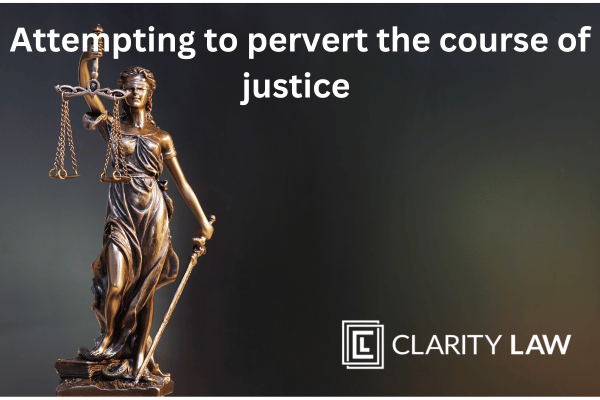
Attempting to pervert the course of justice is a serious criminal charge in Queensland that occurs in circumstances where a person attempts to stop justice being served on themselves or even another person by their conduct.
What does the law say?
Section 140 of the Criminal Code 1899 states that:
(1) A person who attempts to obstruct, prevent, pervert, or defeat the course of justice is guilty of a crime.
Maximum penalty—7 years imprisonment.
What do the prosecution need to prove for this offence?
The prosecution must prove beyond a reasonable doubt the following, in order to succeed in a prosecution for this offence:
-
The defendant;
-
Through their actions or conduct did something that has a real risk of justice being perverted or an injustice occurring; and
-
The defendant intended for the outcome of their actions to have the effect of stopping justice being done.
It is important to note, that the defendants conduct does not need to be successful in perverting justice, just that their actions had a real risk of that occurring.
Are there any defences?
At law, there are a wide range of defences to criminal charges, however not every defence is available to every charge. Examination of available defences depends on the context of the alleged offending, some examples that may be available are:
-
Duress;
-
Identity;
-
Intention – Where the prosecution cannot prove the defendant intended to pervert the course of justice; and
-
Honest and reasonable mistake of fact.
What court will hear my case?
This matter, like all criminal matters will start in the Magistrates Court of the jurisdiction where the offence occurred. This offence however, must be committed (see our article on committal process here), to the District Court of Queensland.
What does this charge look like?
Perverting the course of justice is a very broad charge, and ultimately could come in many different forms. Below are a few examples of how this charge may come about:
Example 1
Jill is in being held on remand, awaiting trial in the Supreme Court for a series of domestic violence matters against her partner Jack. Jill, struggling to deal with being inside the correctional facility reaches out to her sister – who can still contact Jack – to ask her to have Jack recant his statement of events to try and have the charges dropped. Jills’ sister refuses do as Jill has asked, and tells Jill that she wont do it.
Jills phone call is monitored and recorded, and subsequently sent to police who make the decision to charge her with attempting to pervert the course of justice.
In the event that Jane contacts Jack to tell him how much Jill is struggling, how sorry she is and how much she needs to get out. Jack calls the police and reports that his has occurred.
The police now have grounds to charge Jane with an offence of attempting to pervert the course of justice.
Example 2
Ryan is caught by police with cannabis on his person. Ryan is arrested, given watchhouse bail and a notice to appear date. Ryan decides to go make a script for cannabis and enters negotiations with police, however it is discovered that he his script is a forgery and he is subsequently charged with a fraud offence, and an attempt to pervert the course of justice offence.
The above are not the exhaustive list of ways this offence can arise. All to commonly this offence arises out of circumstances where an offender tries to have a victim change or withdraw their statement and inevitably are caught then charged with a very serious offence.
Usual Penalties
Given that this is a strictly indictable offence (meaning it must be heard before a Judge of the District Court), this offence carries some very severe maximum penalties, depending on circumstances of aggravation.
A review of the sentencing statistics between 2005 and 2018 show that approximately 52% of offenders in Queensland received a term of actual imprisonment. However, this does not factor the difference between the more serious circumstances of the offending. Community Based Orders and suspended sentences are available options. (Russell Tannock of our office has written a comprehensive article on how periods of imprisonment may be served here).
Do I need a lawyer?
Do not attempt to represent yourself in the court on an attempting to pervert the course of justice charge. Even if you are charged with an offence without a circumstance of aggravation it is not advisable to undertake this matter yourself. Based on the seriousness of the offending, including if violence was used then the risk of imprisonment arises, engaging an experienced criminal lawyer will help you get the best available outcome. If the court records a conviction against you it may affect your ability to travel internationally and to gain employment.
Conclusion
This article, is by no means a complete breakdown of the serious offence of attempting to pervert the course of justice. This article serves to give a person an understanding of the offence, illustrating how it may come about. This is not a matter where you should attempt to undertake it yourself. If you require advice about this type of matter, feel free to contact clarity law for an obligation free consultation.
Engaging Clarity Law to act for you
Engaging us gives you the best chance at trying to avoid serving time in prison. We are one of the leading criminal law firms in South East Queensland. Just some of the benefits of us acting for you include;
1. we know the judges and what they want to hear to give you the best outcome
2. we have good relationships with the prosecutors meaning we can often have them not seek an actual prison sentence
3. we are there to help you through the process and make everything as stress free as possible
4. engaging us shows the court you are taking your charges seriously
5. you will be fully informed of what is to happen in court and what this means for you after court
6. unlike the police or the Judge, we are there to look after you, your privacy and your interests
How do I get more information or engage you to act for me?
If you want to engage us or just need further free information or advice then you can either;
1. Use our contact form and we will contact you by email or phone at a time that suits you
2. Call us on 1300 952 255 seven days a week, 7am to 7pm
3. Click here to select a time for us to have a free 15 minute telephone conference with you
4. Email the firms founder on This email address is being protected from spambots. You need JavaScript enabled to view it.
5. Send us a message on Facebook Messenger
6. Click the help button at the bottom right and leave us a message
We are a no pressure law firm, we are happy to provide free initial information to assist you. If you want to engage us then great, we will give you a fixed price for our services so you will know with certainty what we will cost. All the money goes into a trust account monitored by the Queensland Law Society and cannot be taken out without your permission or until we are legally allowed to.
Will I go to jail for breaching a DVO
An all to common offence that the Court system deals with is one of Breach Domestic Violence Order. This article is not going to be an examination of what this offence is, our office has written a comprehensive article on the subject here.
What this article aims at answering, is the question that we as criminal defence practitioners are asked, “Am I going to go to jail for breaching my domestic violence order?”
What do the statistics show?
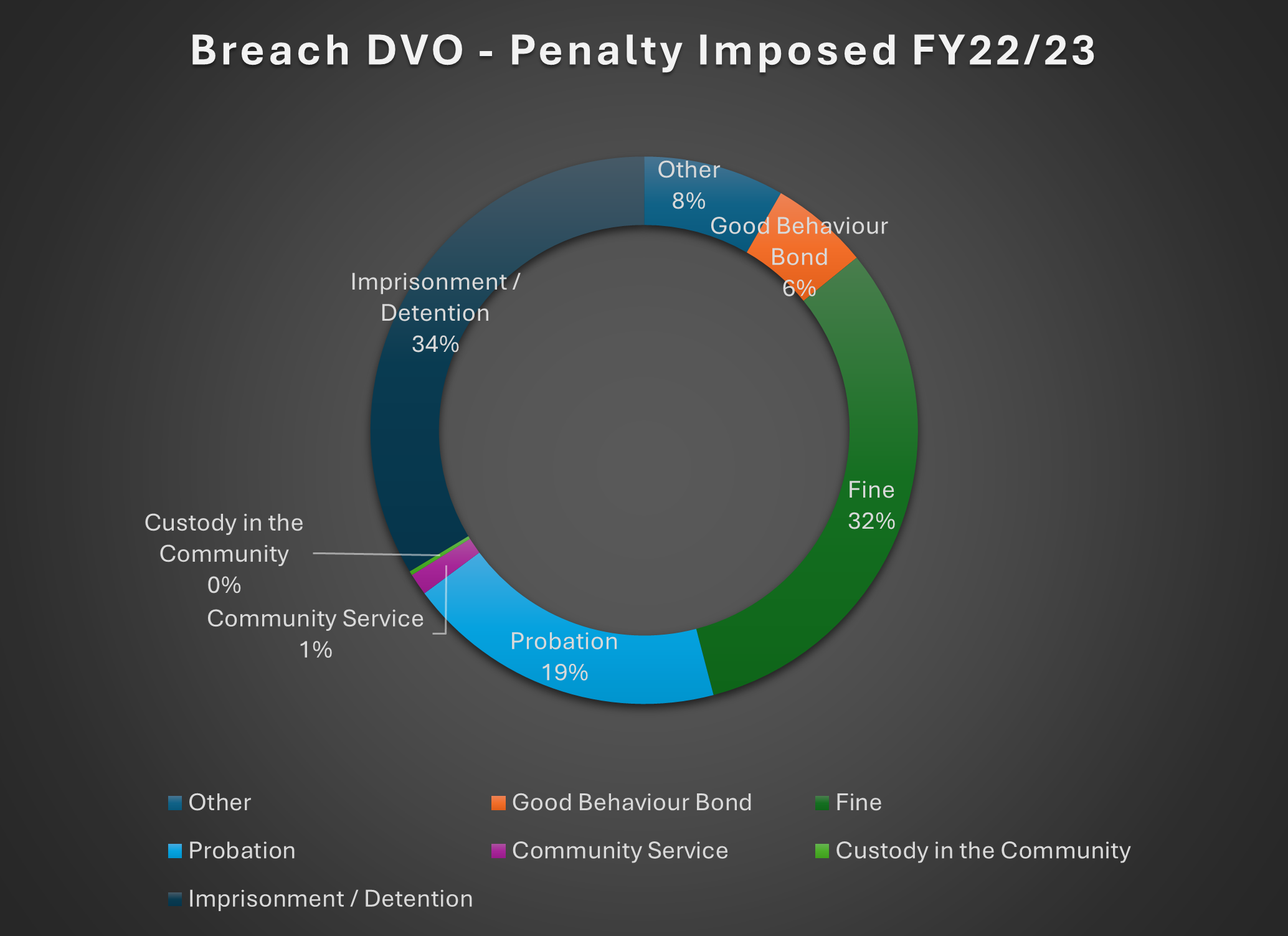
The above graph demonstrates the FY 22/23 sentencing statistics as it relate to Domestic Violence offences, however the data reflects the most serious penalty imposed at the time they are sentenced for their charges.
What can we glean from this graph?
The initial takeaway is that the most common penalty imposed is that of Imprisonment or Detention, this however does not take into account partially or wholly suspended sentences, nor does it take into account objective seriousness of the offending. Let it be clear, the charge of Contravene Domestic Violence Order is a charge the courts take very seriously.
However, the court is required to take each case on its facts and impose a sentence that is just in all the circumstances.
The Court will look at the following factors in determining what penalty to impose:
-
What was the exact nature of the breach, was it serious or was it more of a technical breach
-
Does the defendant have a criminal history and if so for what and how recent was it
-
Was any violence used in the breach
-
Were any children present during the breach
-
What impact did the breach have on the aggrieved?
-
The timing of the breach i.e. how long was the DVO in place before it was breached
-
Was it an early plea of guilty
-
Is the defendant sorry for his or her actions?
-
How old is the defendant?, youthful defendants will often receive a lesser sentence
The court must also take account of the provisions of section 9 of the Penalties and Sentences Act. In summary those are that the purpose of the sentence is to punish the offender to an extent or in a way that is just in all the circumstances, facilitate avenues of rehabilitation, deter the offender and others from committing a similar offence, make it clear that the community denounces the conduct in this offence, and protect the community.
There has, in our experience been an increase in willingness of Courts to sentence offenders to periods of imprisonment for non-violent and persistent breaches of orders.
Conclusion
While it appears statistically that a period of imprisonment, in some form follows as a result of a Breach of Domestic Violence Order offence, these statistics cannot be taken in isolation. A breach of a DVO is a serious charge and viewed so by the Magistrate and the Prosecutor. You do not want to face a court by yourself with this charge. There are serious penalties that can be imposed and the court must also decide whether to record a conviction or not. If a conviction is recorded you could be prevented from travelling overseas or getting certain jobs or work contracts.
We will reiterate - Courts have been cracking down on DVO cases lately and the pressure to apply harsh sentences is only increasing as the community continues to denounce the behaviour.
An experienced criminal defence lawyer will know what mitigating information can be put to Magistrate to in order to reduce the penalty and how to negotiate with the prosecutor where necessary.
How do I get more information or engage you to act for me?
If you want to engage us or just need further free information or advice then you can either;
-
Use our contact form and we will contact you by email or phone at a time that suits you
-
Call us on 1300 952 255 seven days a week, 7am to 7pm
-
Click here to select a time for us to have a free 15 minute telephone conference with you
-
Email the firms founder on This email address is being protected from spambots. You need JavaScript enabled to view it.
-
Send us a message on Facebook Messenger
-
Click the help button at the bottom right and leave us a message
-
Visit our main DVO page for all the information you could ever need
We are a no pressure law firm, we are happy to provide free initial information to assist you. If you want to engage us then great, we will give you a fixed price for our services so you will know with certainty what we will cost. All the money goes into a trust account monitored by the Queensland Law Society and cannot be taken out without your permission or until we are legally allowed to.
Unlawful entry of a vehicle
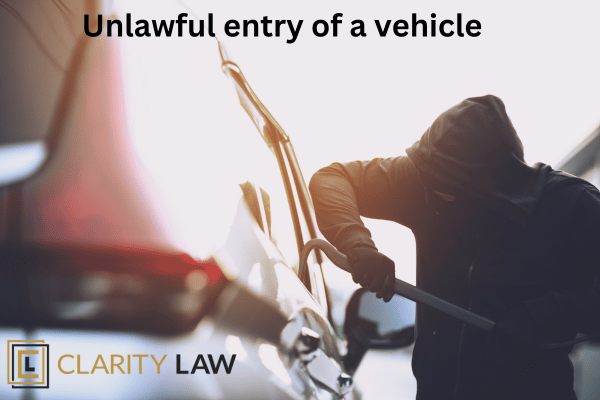
In Queensland there are a number of offences which exist under the umbrella of Burglary and like offences, of those a commonly charged offence is unlawful entry of a vehicle, for committing an indictable offence.
The Law
What does the law say the charge is?
(1) A person who unlawfully enters another person’s vehicle with intent to commit an indictable offence commits a crime.
(2) If—
(a) the offence is committed in the night; or
(b) the offender—
(i) uses or threatens to use actual violence; or
(ii) is or pretends to be armed with a dangerous or offensive weapon, instrument or noxious substance; or
(iii) is in company with 1 or more persons; or
(iv) damages, or threatens or attempts to damage, any property;
What do the police need to prove in order for this offence?
The police need to make out each of the following elements for an offence to have occurred:
A person,
-
Unlawfully enters;
-
Another person’s vehicle;
-
With the intent to commit an indictable offence.
This simply requires the police to prove that the defendant, has entered another person’s car without lawful reason, and that person had the intention to commit further offences.
There are, as shown above circumstances which increase the seriousness of the offending, these are called the circumstances of aggravation. The elements of these as above are straightforward, such as did they occur in the night, was the defendant armed or were they in a group.
Circumstances of aggravation expose a person to a greater maximum penalty than is available for the simpliciter offence.
What does this look like in practice?
James and a group of his friends are wandering around Chermside at 11pm at night. They come across an unlocked car and James’ decides to hotwire the car and go for a joy ride. James has entered the car, has his torso in the footwell and is attempting to start the car. A light inside the house comes on, James runs away into the night.
A CCTV camera has caught the event and James is identified and arrested. James has been charged with the offence for unlawfully entering the vehicle, with the intent to steal the car – being the indictable offence.
Defences
There are defences to the charge, including but not limited to:
- Genuine and honest mistake of fact;
- Lawful entry to the vehicle;
- Ownership of the vehicle;
- No intention of committing an indictable offence; or
- Duress
Penalty
The maximum penalty for this offence is up to 10 years imprisonment or if a circumstance of aggravation is present, up to 14 years.
The circumstances of aggravation are:
- uses or threatens to use actual violence; or
- is or pretends to be armed with a dangerous or offensive weapon, instrument or noxious substance; or
- is in company with 1 or more persons; or
- damages, or threatens or attempts to damage, any property;
The penalty range for the simpliciter offence is varied, ranging from a fine to a period of actual imprisonment. The court considers this to be a serious offence, and even more so where aggravating features are present.
Where will my matter be heard?
The matter will start in the magistrate’s court in the jurisdiction closest to where the offence occurred. The matter will stay in the magistrate’s court, unless violence was threatened or actually used, in which case the matter must be delt with on indictment in the district court.
Will I get a criminal conviction if I plead guilty to the charge?
The answer is possibly. It depends on a number of factors. Only an experienced criminal lawyer can give you advice on the best way to try and avoid a conviction being recorded if you plead guilty to this charge. Note however if imprisonment is part of the penalty then a conviction must be recorded.
Learn more about the difference between a conviction and non-conviction
The police want to talk to me about an offence!
Never ever give an interview to police without first getting legal advice. Even if you are innocent, even if you have a defence you could say the wrong thing and virtually guarantee you will be found guilty of the charge.
The police are not on your side, get immediate legal advice.
Learn more about your right to silence.
I’m not guilty of the offence.
Still don’t talk to the police. A lawyer would require the prosecutor to give them all their evidence and statements. This is known as the full brief of evidence. Once the brief was received then negotiations with the prosecutor to drop the charge can occur.
Learn more about what to do if accused of a crime you didn’t commit.
- I didn’t do it! What to do if Accused of a Crime you didn’t Commit
- Visit our main criminal law website
How do I get more information or engage you to act for me?
If you want to engage us or just need further free information or advice then you can either;
1. Use our contact form and we will contact you by email or phone at a time that suits you
2. Call us on 1300 952 255seven days a week, 7am to 7pm
3. Click hereto select a time for us to have a free 15 minute telephone conference with you
4. Email the firms founder on This email address is being protected from spambots. You need JavaScript enabled to view it.
5. Send us a message on Facebook Messenger
6. Click the help button at the bottom right and leave us a message
We are a no pressure law firm, we are happy to provide free initial information to assist you. If you want to engage us then great, we will give you a fixed price for our services so you will know with certainty what we will cost. All the money goes into a trust account monitored by the Queensland Law Society and cannot be taken out without your permission or until we are legally allowed to.
Threatening violence
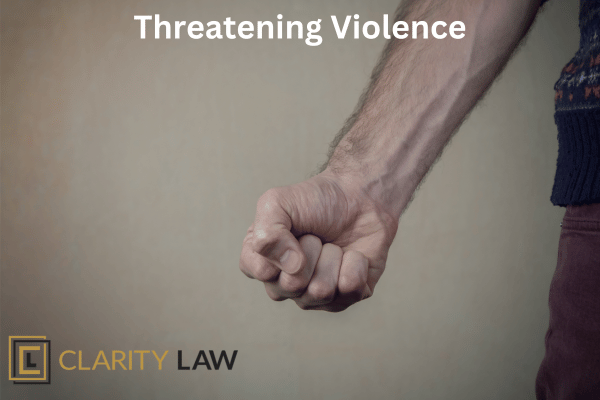
Threatening violence in Queensland is a criminal offence where a person through their acts and/or words threatens another person with the intention to intimidate or annoy that person. The charge is commonly confused with Common Assault and Threats. This article seeks to outline and broadly examine Threatening Violence for those seeking additional information on this charge.
What does the law say?
Threatening violence involves the intentional use of, actions or words against another in order to intimidate or annoy that person, including threats to enter property.
Section 75 of the Criminal Code states:
(1) Any person who—
(a) with intent to intimidate or annoy any person, by words or conduct threatens to enter or damage a dwelling or other premises; or
(b) with intent to alarm any person, discharges loaded firearms or does any other act that is likely to cause any person in the vicinity to fear bodily harm to any person or damage to property;
commits a crime.
Penalty—
Maximum penalty—2 years imprisonment.
(2) If the offence is committed in the night the offender is guilty of a crime, and is liable to imprisonment for 5 years.
The Prosecution must prove each of the relevant provisions beyond a reasonable doubt to succeed in a prosecution for the charge.
s75(1)(a):
-
The defendant, by acts or words threatened to enter or damage a dwelling (home) or premises (including the land boundary); and
-
The defendant did so with the intent to annoy or intimidate another person.
s75(1)(b):
-
The defendant discharged a loaded firearm (or did any other act likely to cause any person in the area to fear bodily harm to a person or damage to property); and
-
The defendant did so with intent to alarm any person.
What are the elements of the offence?
-
A person through their words or actions threaten to enter or damage a dwelling or other premises; and
-
The person intended to intimidate or annoy another person.
or
-
A person discharges a loaded firearm or did an action which likely would cause fear of harm or damage; and
-
The person intended to alarm any person.
What do these elements actually mean?
Threatened - The court has determined that threatened takes its ordinary English word. A threat must be of such a nature and intent that an ordinary person might be influenced or frightened.
Intention – The court and parliament have determined again that Intent and Intention take their ordinary meaning. Intention can be inferred or drawn out from circumstances prior to and resulting from the conduct of the defendant before, during and after their conduct and acts.
The charge ultimately requires that a person threatens to enter a property (including but not limited to their home, their yard, their place of business ect) and the purpose of that threat to enter is to either intimidate or annoy that person.
Discharged a loaded firearm – This element is fairly self explanatory, did the person fire a firearm. Where there arises some ambiguity is acts likely to cause the fear of bodily harm to a person or damage to property. Such an extended definition could look like the producing and brandishing of a firearm, cocking the weapon and pointing it at a person.
What does this actually look like?
Some examples of what a Threatening Violence under s75(1)(a) looks like:
Mr Hatfield has a longstanding feud with his neighbour Mr McCoy. Mr Hatfield has taken exception to how Mr McCoy has let his hedges grow out and so Mr Hatfield standing at his front gate shouts at Mr McCoy that he is going to come onto his land and destroy his hedges. Mr Hatfield clearly has the intention to enter Mr McCoy’s property and damage his hedges.
Mr Jones is driving home from work when Mrs Smith cuts him off in traffic. Mr Jones follows Mrs Smith home and once she parks her car at home, he gets out of his car. Mr Jones is shouting and swearing at Mrs Smith and tells her that he is going to get his tire spanner from the boot of his car and break her windows for cutting him off. Mr Jones walks back to his car and opens his boot. Mrs Smith yells that she is calling the police and Mr Jones gets in his car and drives off. Mr Jones has by both his verbal threats to damage Mrs Smith’s car and the action of going to get the tire spanner form his vehicle cause Mrs Smith to be intimidated. Mr Jones’ intention can be clearly demonstrated through is words and conduct.
An example of what a Threatening Violence under s75(1)(b) looks like:
Mr Evans is trying to sell a stolen motorcycle to Mr Brown to make some quick money. Mr Evans gets frustrated with Mr Brown asking questions about its registration and service history and an argument breaks out between them about the bike being stolen and Mr Brown threatens to call the police. Mr Evans produces a firearm from his shorts and points it at Mr Brown, saying I am going to shoot you in the face if you do not get out of here right now. Mr Evans through his conduct has done an action which has caused fear of bodily harm to Mr Brown and it was Mr Evans intention to cause this fear in Mr Brown.
What are the defences to this charge?
The most common defences to this offence are:
-
Mistake of Identity – meaning that the defendant is not the person who committed the offence;
-
The words or actions did not constitute a valid threat;
-
The defendant did not have the intention to threaten, annoy or intimidate the person;
-
The defendant was not armed with a firearm (including replica);
-
Self-defence; or
-
Duress
What court will hear my matter?
All matters will commence in the Magistrates Court closes to where the offence occurred. If the charge occurred during the day, then the matter must be heard in Magistrates Court. If the offence occurred at night and police charge with this circumstance of aggravation, then the matter will be committed to the District Court to be dealt with.
The police want to talk to me about a matter where it is alleged I have threatened violence.
Never ever give an interview to police without first getting legal advice. Even if you are innocent, even if you have a defence you could say the wrong thing and virtually guarantee you will be found guilty of the charge.
The police are not on your side, get immediate legal advice before talking to police and if you can’t get that legal advice don’t talk to the police.
Learn more about your right to silence.
Can the charge be withdrawn?
Depending on the circumstances it may be possible to negotiate the charge with the prosecutor. This is called case conferencing. For example it might be possible to try and convince the prosecutor that the element of the charge aren’t made out or the defendant has a defence and therefore the charge should be withdrawn.
Conclusion
This article is by no means a completely comprehensive outline of the charge of threatening violence. This article is designed to give an overview of the charge, what the prosecution must prove and what the charge may look like in practice. If the police want to speak with you about a matter or you have been charged with threatening violence, please feel free to contact our office for a free initial consultation.
How do I get more information or engage you to act for me?
If you want to engage us or just need further free information or advice then you can either;
1. Use our contact form and we will contact you by email or phone at a time that suits you
2. Call us on 1300 952 255 seven days a week, 7am to 7pm
3. Click here to select a time for us to have a free 15 minute telephone conference with you
4. Email the firms founder on This email address is being protected from spambots. You need JavaScript enabled to view it.
5. Send us a message on Facebook Messenger
6. Click the help button at the bottom right and leave us a message
We are a no pressure law firm, we are happy to provide free initial information to assist you. If you want to engage us then great, we will give you a fixed price for our services so you will know with certainty what we will cost. All the money goes into a trust account monitored by the Queensland Law Society and cannot be taken out without your permission or until we are legally allowed to.
Can I ask the Court to close for my sentence?
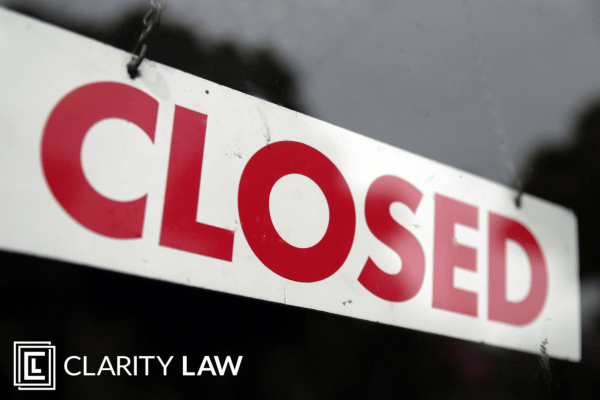
A person coming before the court for the first time is rightfully nervous, they are thinking about what the penalty will be, if there is any disqualification, is a conviction going to be recorded! There is no shortage of things to consider. People incidentally will turn their mind to, what is going to happen to my reputation, will my matter be reported on. Queensland courts, with few exceptions, operate under the principle of the General Rule of Openness. I have written a companion article for this one about whether or not a case can be published in the media, here.
Many clients ask whether they can request that the court be closed during their sentence?
Why are courts “Open”?
In Queensland there is a principle called the General Rule of Openness, which has been described as being a fundamental principle of our judicial system. The general rule is that all criminal court proceedings are open to the public and can be freely reported on. There are some exceptions to this rule, mainly surrounding Domestic Violence matters and matters relating to Children, such as Childrens Courts or where Children or victims of sexual assault are giving evidence.
In addition an offender who has cooperated with authorities (ie an informer) might have some evidence or part of the sentence closed.
Can I ask the Court to close for my sentence?
No.
Once an adult matter is proceeding to sentence, that meaning any special witnesses have given their evidence, the sentence will occur in open court, to allow for the principles of open and transparent justice to prevail.
As we have previously written, the likelihood of a matter being reported on by the media will depend on the seriousness of the offence, the location of the court and whether there are any special features of the case (including but not limited to a celebrity or matter of public interest).
You cannot simply ask that the court be closed as the sentence taking place in an open court will cause embarrassment, affect your employment or social wellbeing.
What can I do?
There is, in essence not a lot that can be done to close the court.
Conclusion
While it is a naturally distressing time in your life, the thought of an additional punishment in the court of public opinion can add unneeded stress. It is for better or worse an underpinning principle that the administration of justice occurs openly and publicly. The only thing that a defendant can do, is focus on the conduct of their case.
What happens when the Police want to talk to me over the weekend or during the holidays?

It is generally well understood that Police stations are staffed and operating 24 hours per day, seven days per week inclusive of weekends and public holidays. This can result in an officer who has been assigned the investigation or follow up of a criminal or traffic matter to be working irregular or out of business hours shifts.
It necessarily follows that a police officer may contact a witness, suspect or person of interest to schedule an Electronic Record of Interview or request them attend the police station during one of their shifts.
This could look like a person receiving a phone call, text message or even a visit to their home address when they are not expecting it. While it may be useful for people to attend the police station outside of working hours, this may create an issue where a person wishes to exercise their right to have a solicitor present during any interview.
While it may not be entirely necessary for you to have a solicitor present during any interview that you elect to give (see our article on whether or not you should give an Electronic Record of Interview here), if you attend a Police station on a Public holiday or outside of business hours, there may be an impact on your chosen legal representatives availability or additional costs associated with that attendance.
What should I do if the Police want to talk to me during a public holiday or on a weekend?
If the police want to talk to you on a Saturday or Sunday, or worst-case Christmas Day, you have all the same rights as you would if it was any given Monday. You have the right to have a support person, family or Lawyer present during any questions. The issue arises of availability of your support person or legal representative.
If you have advanced warning of an interview, and you wish for your legal representative to be present it is usually best to attempt to reschedule the interview for a time that is within normal working hours. However, this may not always be achievable.
What happens if I am arrested on a Public Holiday or Weekend?
If you are arrested on a Public Holiday or Weekend, and the police decide not to give you watchhouse bail, then you will be held in the watchhouse until such time that the court can get you in front of a magistrate for a bail application. Some courts will run on Saturday for in custody matters, however that is not the case for every court.
What happens, you might ask if you are arrested during the Christmas Court Closure period? The court will be available for certain urgent matters, including bail applications as needed. Each Court will maintain an on-call Magistrate for the relevant times. The exception will of course be Christmas Day and Sundays.
Here is some more information about bail that may be useful
Conclusion
In conclusion, it is typically best to wait until working hours to attend on a police station for the purposes of an Electronic Record of Interview, or to receive documents. In the event that is not achievable, and you intend on having your lawyer available to you, give as much advance notice as possible and anticipate that there may be additional costs for that attendance.
Remember never give an interview to police unless you have first obtained legal advice.





